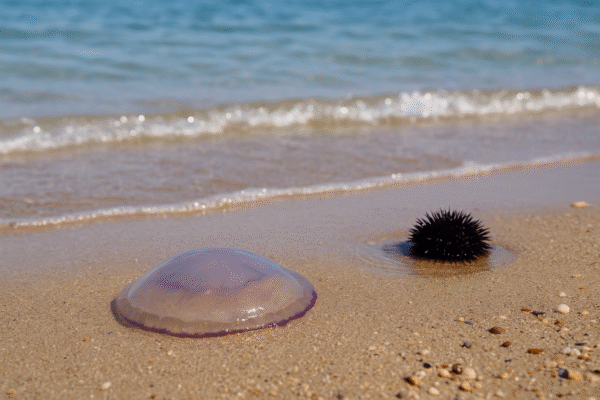Turkey, celebrated for its sun-kissed Mediterranean and Aegean shorelines, has issued a timely safety advisory for beachgoers amid rising concerns about harmful marine life. With reports indicating increased jellyfish blooms and sea urchin presence along popular coastal areas, tourists are being encouraged to stay vigilant and follow local guidance to avoid beach-related incidents.
Heightened Presence of Jellyfish and Sea Urchins
Recent weeks have seen a noticeable increase in jellyfish clustering along Turkey’s coastal waters, particularly in tourist hotspots such as Mersin and segments of the Mediterranean coastline. Marine experts attribute this surge to rising sea temperatures and shifting marine food chains, a trend that threatens both beach safety and the tourism sector.
Simultaneously, sea urchin activity has also intensified. These spiny organisms pose injury risks, with painful punctures known to cause inflammation and, in some cases, infection. The venom of their brittle spines can inflict burning sensations and lingering discomfort, especially when embedded spines complicate treatment.
Why This Matters for Holidaymakers
Turkey’s beaches, a magnet for millions of global visitors, now require extra caution. Jellyfish stings can range from irritating rashes to severe allergic reactions, while sea urchin wounds may lead to infection if not managed promptly. Environmental authorities and tourism officials warn that vulnerable groups—such as children and those with allergies—should take particular care when entering sea waters.
What Travelers Should Do
- Check Local Beach Notices: Before heading into the water, consult beach signage or seek updates from lifeguards and resort staff. Many beaches now implement warning flag systems to signal marine hazards; a red flag, for example, often means it’s off-limits for swimming.
- Wear Water-Appropriate Footwear: Investing in water shoes or sand socks can protect feet from sharp sea urchin spines often hidden in shallow water or rocky areas.
- Observe Safe Swimming Areas: Avoid zones where jellyfish tend to gather. Some coastal resorts are introducing protective nets or designated safe zones to mitigate risks.
- Know First-Aid Steps: Familiarize yourself with basic responses to jellyfish stings—such as rinsing with sea water rather than fresh water—and sea urchin punctures, including warm soaks and careful spine removal.
- Seek Medical Assistance Without Delay: Prompt medical attention can be crucial, especially if symptoms escalate. Ensure your travel insurance covers treatment for marine-related injuries.
Impact on Coastal Tourism
Turkey’s tourism industry remains robust, yet this advisory underscores the unpredictable nature of marine environments. With jellyfish proliferation connected to broader environmental shifts, the issue extends beyond immediate risk—it’s also a reminder of ongoing ecological challenges affecting seaside destinations.
Tourism authorities are reinforcing beach safety practices and encouraging visitors to enjoy the coast while staying informed and prepared.
Looking Ahead: Environmental Context
Environmental groups and marine researchers warn that jellyfish bloom frequency may continue to increase in the future. Warmer waters, pollution, and ecosystem changes contribute directly to these surges. Meanwhile, the delicate balance involving sea urchins—key to controlling algae growth—is being affected, adding complexity to marine sustainability efforts.
A Safe, Enjoyable Turkish Coast Experience
Turkey’s captivating beaches—from the turquoise coves of Bodrum to the golden stretches of Antalya—remain some of the world’s most beloved holiday destinations. By adhering to local safety advisories and taking sensible precautions, travelers can still indulge in sun, sea, and scenery with peace of mind. Staying alert to jellyfish blooms and sea urchin risks ensures that your coastal getaway remains both memorable and secure.
For more travel news like this, keep reading Global Travel Wire



















